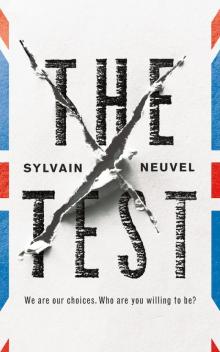- Home
- Sylvain Neuvel
The Test Page 2
The Test Read online
Page 2
There’s a television set in the waiting room behind the man in charge. No sound. I can’t hear it through the window if there is. I see the building we’re in. It’s a helicopter shot. Dozens of police cars. Tactical teams. We must be on every channel. I can’t read the text at the bottom of the screen. Tidir is still on her knees facing the floor; so are the kids. Good. She must know he’s talking to me. I hope she doesn’t do anything. She won’t. She’s smarter than I am. I bet she could read the small print if she were in this room. Tidir has the best eyesight. She can read street signs before I even know there is a street sign. She finds even the smallest toy parts Ramzi leaves behind. More aerial shots of the building. “Terrorism” in bold white letters, big enough even for me to see. I hope no one dies because of me. I’ve started a chain of events I can’t seem to stop. Please let no one else suffer for it.
—I tell you what, Samaritan. I have a phone call to make, but I’ll get back to you in a sec. Don’t worry.
I am worried, but it feels good to have his eyes off me. He must be talking to the police. I can’t hear the words, but he’s probably making demands. It does not matter at this point. Either they’ll surrender—that seems unlikely—or tactical teams will storm in and fire at everything that moves. People will get shot. Bad people, good people. Collateral damage. One thing is for sure, they will not meet their demands. They will negotiate—that could last for days—get the man in charge to release a few hostages if they can. That is what we are, now. Hostages. They will show good will, send some food, but in the end they will come in and people will die. I think I just heard him say “fifteen minutes.”
—Every fifteen minutes! You hear me!
I do. I wonder if he was shouting to the people on the phone or if this was for our benefit. If it was, it seems pointless. Everyone here is already as scared as they can be. He’s established his dominance; now what? All I can do is wait. There is no way out of this room, only the door I came in through. Even if there were, I could not leave without my family and the man in charge is standing five feet away from them. He is in control.
—Samaritan! I told you I wouldn’t forget about you!
What does he want with me?
—Samaritan! Look at me when I’m talking to you! What are you here for? Why are you in this room? Did they punish you because you stuck your nose where it didn’t belong like you did with me?
Maybe I can do some good. Maybe if he focuses all his attention on me, everyone else will be safe. My family will be safe.
—I didn’t. I’m . . . I’m here for a test.
—A test?! What kind of test?
—Ci . . . A citizenship test.
—Citizenship! That’s right! You’re a fucking immigrant! Where are you from?
This is my chance. I cannot fade into the background anymore, but I can try to become human again. Right now, I am only a hostage to him, a means to an end. Dehumanized. If I share some personal things . . .
—Teheran.
—You’re from Irak!
—Iran.
—Iran, Irak . . . You’re a Muslim, aren’t you? Why’d you come here?
—We were . . . Our lives were in danger.
—Our lives . . . You have a family?
—Yes, sir. They came with me.
—Let me get this straight. You leave your country because . . . you’re in danger. You take your wife, your kids? Kids, plural?
—Yes, sir. Two of them.
—Good for you. You get them out of Iran and you come to this place, and now you’re here, today, for a fucking citizenship test. Wow. That’s messed up. That is some bad fucking luck, my friend! How’s it going?
—What?
—The test. How is it going so far?
—I . . .
—Is it easy? Is it hard? Come on, Samaritan! I’ve got time. Let’s get you through that test!
—. . .
I don’t know why is he’s doing this. There’s nothing genuine about him, nothing good.
—I’m trying to help you here! Are you going to refuse my help?
It does not matter why he is doing it. He is not hurting anyone while he’s talking to me.
—No, sir. Thank you, sir.
—There. Gratitude. That’s what I like to hear. What’s the next question?
—I . . . It’s on the desk, sir.
—Then get the fuck up and go back to your desk! We don’t have all day!
He had that man shot because he wouldn’t get down. Now he wants me to get up. Do what he says, Idir. Everything will be fine. I will not sit on the chair. I’ll just kneel in front of the desk and swipe left to the next screen.
—Yes, sir. It’s . . . I’m at question six.
—Six! How many are there?
—Twenty-five. This is question six of twenty-five.
—Shit. That’s a lot. We better hurry then. What’s the question?
—How old was Mary Stuart when she became Queen of Scotland?
—That’s the question?
—Yes, sir.
—What kind of question is that? Why do you need to know that to be a citizen? I don’t know that!
—There are lots of historical questions, sir.
—And?
—That is the question, sir. How old was Mary Stuart when she became Queen of Scotland?
—What’s the fucking answer?
—Oh. I don’t know.
I am much too scared to think, but I really don’t know the answer. If I did, I might not have told him. I don’t think I should. The last thing I want is to sound like a know-it-all.
—You don’t know?
—No, sir. I don’t.
—Is it multiple choice or open answer?
—Multiple choice.
—Shoot!
—There are four . . . four answers to choose from: One week old. One month old. One year old. Five years old.
—None of these make sense. Does anyone know? Anyone?
Please let no one answer. Please. Keep him focused on me.
—People! Wake the fuck up! Samaritan here is going to flunk his test if no one answers!
—Six days. She was six days old.
Who said that? It came from inside the test room. One of his men behind me.
—Six days old! Are you sure?
—Uh-huh.
—Look at you, smarty-pants! That makes no sense, though. Six days old . . . What would she do? There ya go, lads! The baby pooped! Let’s sack York!
Does he expect us to laugh at his jokes? Let him speak, Idir. Let him speak all he wants. The longer this takes, the better chance we have. The police might come in.
—All right, Samaritan, one down. What’s the next one?
—Question seven. Which . . . Which stories are associated with—
—Oh oh! I’m afraid we’re out of time, Samaritan. . . . Get up.
—What?
—Get up! I help you, now you help me. That’s how it works. . . . I said get up! Good, come here.
We are standing two feet from each other, only a window between us. He’s staring at me. I won’t stare back. I’ll keep looking at the floor. For a second, I saw . . . There’s something wrong about the way he looked at me. There’s no . . . emotion, nothing in his eyes. I think I made a mistake. Humanizing myself won’t change a thing. That man is a psychopath. He could not care less if I’m a person or not.
—You! Get up. Over here.
Who is he talking to? He’s not looking at me anymore, the man in charge. He’s helping someone off the floor. The redheaded man, I’ve seen him before. He was sitting in the corner when we came into the waiting room. He made that crude joke about the receptionist. He’s wearing a suit, probably his one suit. I did not notice before, but it’s a size too small and his shoes are worn. He looks about my age, maybe a bit older. Late forties.
—Who do we have behind door number one? What’s your name, sir? Oh, don’t be shy.
—Graham.
—You can l
ook up, everyone.
He wants all of us to see this, whatever this is.
—And what do you do for a living, Graham?
—I’m . . .
—There’s no crying at this game, Graham. Just tell me what you do.
—I’m an accountant.
—Sorry about that, Graham. But all right. Aaaand . . . you. Fatty. Get up.
That kid looks so scared. He’s not a kid, he must be in his late twenties, but he looks . . . pink skin, a little round. Soft, mostly. He’s wearing a powder blue sweater, cashmere maybe. Looks expensive.
—And what’s your name, fat boy?
—. . .
—What is it with the crying?! I’m sorry, I didn’t mean that. You’re not fat, you’re just . . . What the fuck is your name, kid?
—Andrew. Andrew Shaw.
—And how do you spend your days, Andrew Andrew Shaw?
—I make . . . I make designer—
—Never mind. I don’t wanna know. . . . Samaritan! Are you ready?
He’s rubbing his hands. He’s proud of himself. I don’t know where this is going, but I want it to end.
—Ready for what? What do you want from me?
—I’m glad you asked . . . I was on the phone a little while ago with the powers that be, and I asked them for . . . things. Different things. They didn’t like that, my asking for things. That’s understandable. I hate it, too, when people ask. Call me lazy, but I don’t like doing things, in general. I hate taking out the garbage, but I do. I do it because my whole flat will stink if I don’t. I don’t particularly like to eat. It’s a shame, I know, but I don’t. Obviously, I have to. I don’t like stopping at red lights, but I do—I’m a very safe driver—because the police will stop me if I don’t. You understand what I’m saying? I need motivation to do things.
The man in the blue sweater wants to get back on the floor.
—No! No! No! Get your—I was gonna say fat again, sorry. Get your ass back up, Andrew Andrew Shaw. This is for your benefit, too. Where was I? Oh, yes. The police, the government, they also need motivation to do things, so . . . I provided some. I told them that I would kill one person every fifteen minutes if I they didn’t do what I asked them to do . . . Oh, and it’s been fifteen minutes. And they didn’t do what I asked them to do.
—Please don’t do that. Please—
That’s why he picked me. He wants to kill me in front of everyone! I don’t want to die. Not like this, not in front of my children.
—Samaritan! I’m not gonna kill you! Look at you, all shaky and shit! What kind of asshole would I be, helping you with that test, if I put a bullet in your head halfway through? No, I’m not gonna kill you. I’m gonna kill who you tell me to!
I don’t know what he’s saying. There has to be a way to stop this.
—You don’t need to kill anyone, sir. There’s no need for that. I can talk to them, tell them—
—Tell them what? That I’m going to kill someone? I already told them that. Are you someone important? Do you think you’re more important than me?
—No, sir. I’m not. I don’t.
—That’s what I thought. Now who’ll it be?
—Be what? I don’t understand.
—Who. Do. You. Want. Me. To. Kill? Do you have a hearing problem, Samaritan?
—I—No. I don’t want you to kill anyone.
—Sure you do! You wanted to make decisions for me—you didn’t think I forgot about that, did you?—well, now’s your chance. You can either pick Graham, the accountant—
—No, not me! Please, sir!
The redhead. He wants to kill the redhead.
—Shut the fuck up, Graham. Or Andrew Andrew Shaw and his designer shit. Your choice.
He wants to kill the redhead or the kid. I don’t know what he expects from me. I won’t do what he asks.
—I won’t do that. I won’t choose.
—Goddamn it, Samaritan! THERE ARE RULES! Tell me what the rules are.
—I . . .
—The rules! Oh, you haven’t heard the rules yet, have you? My fault! I apologize. It’s just—there’s a lot going through my mind right now. You know how it is. Anyway, here are the rules. Every fifteen minutes, I pick two people and you tell me which one to kill. I kill that person. Simple enough!
—I told you. I won’t do that. I’ll do everything you want, but not that.
—Oh, come on! I’m doing the hard part. I’m the one with the gun. We can switch if you want, but I tell you: I’d rather be in your shoes. You just pick someone. It’s a simple thing. Door number one, or door number two. That’s it! You just tell me who to kill, and I do it . . . OR . . . I forgot about that part. It’s kind of important. OR, I kill them both. . . . See! You’re saving someone, really. . . . Who’ll it be? Older guy with boring job, or fatty here with really bad taste in clothes. Is that fucking cashmere?
—I won’t choose.
—Why?
—I can’t. I can’t tell you to kill someone.
—What do you mean, you can’t? You can’t just now, or like ever?
—Yes.
—Yes, ever? Like on principle?
—Yes.
—That’s bullshit! Like, if someone’s holding a gun and he’ll kill two people unless I tell him to kill one of them I won’t do it? That’s not a principle. That’s just . . . some shit you came up with right now. Come on! Stop wasting my time.
—I’m sorry, sir. I—
—Now you’re just pissing me off. I’m going to make this easy on you, Samaritan. I’m going to count to three, then I’ll pull the trigger if I don’t have an answer. Did you get that? One, two, three, then they die.
—No, I—
—Here we go. One.
The hostages are looking at me, not him. I can’t look at them. They look at me like I’m really deciding which one of them will live. I’m not. I can’t help them. He’s in control, not me. He’s taunting me, messing with my head. He just wants to know if I’ll do it or not. I won’t. I’m not a killer. I won’t make that choice.
—TWO!
He won’t do it. He won’t. . . . Even if he does, even if he kills them both. That’s him, not me. I’m not responsible for this. It’s his choice. Not mine. He wants to kill people. I choose love. I choose life.
—Three. Did I say on three? Oh, fuck it.
Don’t d—
**TAK**
**TAK**
—NOOOOOO!!!!
The sound of bodies hitting the floor. I can’t look.
3.
DOZENS OF COMPUTER SCREENS light up the control room. In the back, behind a glass wall, four people are sitting at their stations, viewing 3D scans of Idir’s family and mapping their faces onto mesh bodies. In the centre, two people—a woman and a man—are sitting at a desk. Both are staring at a large screen showing Idir crawling on the floor, tying his shirt around the injured man’s leg. On a smaller screen to the left, Idir is lying in what looks like a hospital bed, immobile. There are electrodes on both his temples. His eyes are closed and his eyelids are twitching.
The woman is white, early fifties. Her name is Laura. She wears a government-issued grey jumpsuit. She looks at the screen, unfazed by what she sees, and takes some notes on her data pad. This isn’t new to her; she’s overseen more than a hundred of these simulations. The job has taken its toll on her, but she still takes some pride in it. Only a handful of government employees can administer the BVA—the British Values Assessment.
The man is much younger, about half her age. His name is Deep. First in his family to be born in the UK, he picked up some of his parent’s Indian accent but hides it very well. Deep isn’t nearly as calm as his supervisor. This is his final evaluation, his last day as a trainee. First-generation citizens don’t often get this job, and Deep is well aware of it. He is fidgeting in his seat. His eyes keep going from the screen to the BVA manual sitting on his lap.
—Ten points, right?
Laura doesn’t hear him. She’s l
ooking at Idir’s vitals on the small screen. Deep asks again.
—He stopped the bleeding. He gets ten points for trying to save that man, right?
There’s half a smile on Deep’s face. He forgot all about section three, paragraph four the first time he watched. Few people will risk their life to help the man in the baseball cap. But he remembers now.
—Five.
—What?
—Five points. He has medical training.
—He’s a dentist!
—Read subparagraph four point four again.
Deep is angry at himself. He doesn’t need to read 4.4 again. He knows the manual doesn’t make the distinction.
4.4 The total number of points earned in section one under paragraph four is equal to the number of points earned under paragraph four, subparagraphs one to three, multiplied by 1 if any of the following conditions are met:
(a) the test subject does not hold a degree in nursing from a recognized institution. (see appendix 3)
(b) the test subject does not hold a graduate degree in a medical field from a recognized institution
and multiplied by 0.5 if neither condition (a) nor condition (b) are met.
Small mistake. Deep is still feeling reasonably confident about his evaluation. He tallies up Idir’s score for section one.
Perfect score on politeness and courtesy. There are lots of small tests hidden in the BVA simulation. None are worth a lot, no more than one or two points each, but they add up. It’s rare, but these small details sometimes make the difference between citizenship and deportation. Idir is very courteous. He opened the front door for the old lady. He thanked the receptionist and the person who walked him to the test room. Neither are designed to be particularly endearing. He let the man in the baseball cap walk in before him when they went through the door. Most people move out of the way—the man in the baseball cap is rather large—but many lose that point with a complaint or a derogatory comment afterwards. Idir didn’t. He even got up to get napkins when the man in the baseball cap spilled his coffee. Five points.
No penalty for sexism. Idir didn’t laugh at the crude joke in the waiting room. No reaction at all. Not a guffaw followed by an apology. He didn’t even smile. He didn’t make a face or give the man a reprimanding look.

 Only Human
Only Human Waking Gods
Waking Gods Sleeping Giants
Sleeping Giants A History of What Comes Next
A History of What Comes Next Only Human_The Themis Files
Only Human_The Themis Files The Test
The Test